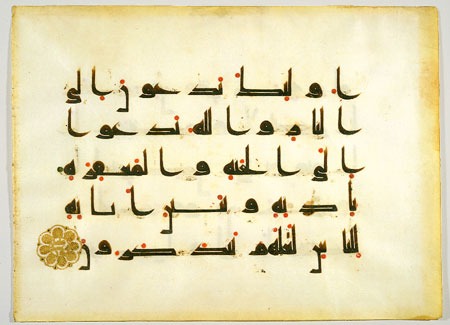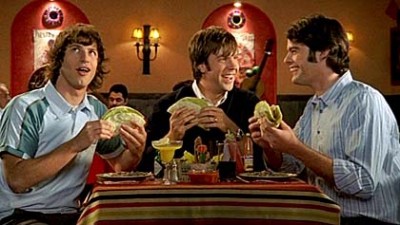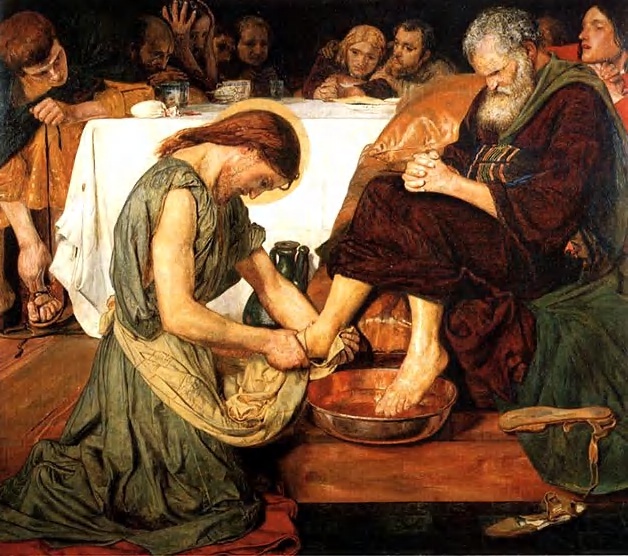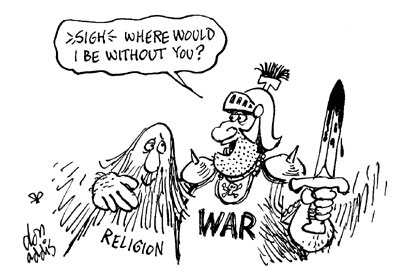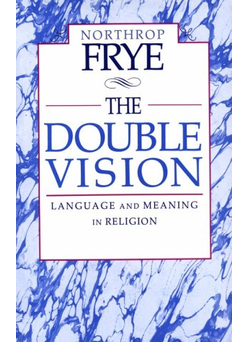Bob Denham has compiled a second collection of Frye quotes on Islam and the Koran, which we have posted in the Library here. (The first set can also be found in the Library here.)
Author Archives: Michael Happy
Frye at the Movies: “Detective Story”
httpv://www.youtube.com/watch?v=O8NnjbzsTP8
Frye refers to this movie in his 1952 diary as a “sardonic masterpiece.” Detective stories generally were a source of almost guiltless pleasure for him (even putting aside their value in studying popular and primitive archetypes), and he made reference to them often. However, this personal account in his 1942 diary of reading them is easily the most charming:
I don’t think that I have either a highbrow or a lowbrow pose about detective stories, but I don’t really quite understand why I like reading them. I read them partly for the sake of the overtones. I’m not a connoisseur of them: I can never guess what the hell’s up when the detective pulls out a watch and shouts: “My God, we may yet be in time!”, shoves the narrator and half the country’s police force into a taxi, dashes madly across town and finds the girl I’d placidly thought was the heroine all equipped with a blunt instrument & an animal snarl. I’m always led by the nose up the garden path in search of a false clue, and I never notice inconsistencies. And I always get let down when I find out who dun it. As I say, I like overtones. A good style, some traces of wit & characterization, a sense of atmosphere, and a lot of the professional intricacies of the game can go to hell. Yet I want a good novel in that particular convention & no other. The answer is, I think, that I’m naturally a slow & reflective reader, & make copious marginalia. In the detective story I live for a moment in the pure present: I’m passively pulled along from stimulus to stimulus, and, ignorant & idle as that doubtless is, I’m fascinated by it. Yet I seldom finish without disappointment. (CW 8, 15)
TGIF: Taco Town
SNL commercial parodies are always worth seeing. This is one of the best. Taco Town is us, and it doesn’t show much sign of no longer being us.
You can watch it here.
Samuel Pepys
httpv://www.youtube.com/watch?v=Dn6E_4g4UAw
From Peter Ackroyd’s documentary series, London: A Biography (based upon the terrific book by the same name), Pepys describes the Great Fire of London, 1666
Yesterday was the anniversary of Samuel Pepys‘s death (1603-1703). Frye, in his 1942 diary, makes some observations on perhaps the most famous diarist in the language. Bob Denham’s remarks in the Introduction to the Diaries volume offers commentary that deserves to be included:
Frye placed a high priority on privacy, and after he became a name, his secretary Jane Widdicombe did succeed in protecting him from most of the countless potential invasions of that privacy. He was fond of telling interviewers that he had unconsciously arranged his life to be without incident, the result being, he claimed, that no biographer would have the slightest interest in him as a subject. John Ayre’s biography is, of course, evidence to the contrary. And however much we might like to agree in theory with Eliot’s principle that there is a difference between the man who suffers and the mind which creates, in practice the principle is very difficult to maintain. When one becomes a public figure, there is a natural curiosity on the part of the public to learn about his or her life. Frye was also fond of insisting that his life was his published work, just as he was fond of quoting Montaigne’s remark that his life was consubstantial with his book. One can understand what he meant by that, and yet this opposition between life and work, at the deepest level, cannot finally be sustained, as Michael Dolzani has shown.[14]
Frye is aware, of course, that whatever aims the diarist might have, what will emerge from all diaries is necessarily self-revelation. The self-revelation may be minimal, but it is there. The absence of sufficient self-revelation is what worried Frye about Samuel Pepys’s Diary:
I’ve been reading in Pepys, to avoid work. I can’t understand him at all. I mean, the notion that he tells us more about himself & gives us a more intimate glimpse of the age than anyone else doesn’t strike me. I find him more elusive and baffling than anyone. He has a curious combination of apparent frankness and real reticence that masks him more than anything else could do. One could call it a “typically English” trait, but there were no typical Englishmen then and Montaigne performs a miracle of disguise in a far subtler & bigger way. Pepys is not exactly conventional: he is socially disciplined. He tells us nothing about himself except what is generic. His gaze is directed out: he tells us where he has been & what he has done, but there is no reflection, far less self-analysis. The most important problem of the Diary & of related works is whether this absence of reflection is an accident, an individual design, or simply impossible to anyone before the beginning of Rousseauist modes of interior thought. (42.67)
A few entries later Frye writes that Pepys’s ” genre, the diary, is not a branch of autobiography, as Evelyn’s is. . . . When I try to visualize Pepys I visualize clothes & a cultured life-force. I have a much clearer vision of the man who annoyed Hotspur or Juliet’s Nurse’s husband. . . . He does not observe character either: I can’t visualize his wife or my Lord. Even music he talks about as though it were simply a part of his retiring for physic” (42.69). Frye, on the other hand, engages in a great deal of character observation—the character of his colleagues, his students, his family, his wife, and, most of all, himself. His diaries provide a rich and extensive psychological portrait. He does not set out to write a confession, but by the time we have come to the end of the diaries, he has confessed more than he perhaps realized.
But the diaries are also a chronicle. We peer over Frye’s shoulder as he trudges to his office, teaches his classes, attends Canadian Forummeetings, reflects on movies, socializes with neighbours and other friends, discusses Blake with his student Peter Fisher, works on his various commissions, eyes attractive woman, records his dreams, plans his career, judges his colleagues and his university, registers his frank reactions to the hundreds of people who cross his path, travels to Chicago, Wisconsin, and Cambridge, plans his fiction projects, reflects on music, religion, and politics, shovels his sidewalk, suffers through committee meetings, describes his various physical and psychological ailments, practises the piano, visits bookstores, frequents Toronto restaurants, reflects on his reading, and records scores of additional activities, mundane and otherwise. As a chronicle, Frye’s diaries are like Virginia Woolf’s, putting the most inconsequential event, such as cutting the grass, alongside the most sober reflection, such as the nature of the contemporary church or the unspeakable uselessness of war. His speculations on a wide range of critical and social and religious issues are not unlike those in a typical notebook entry. His notebooks occasionally become quite personal and thus move in the direction of the diary. His diaries very often become quite impersonal and thus move in the direction of the notebook. The context of the speculative passages is sometimes a contemporary event, as when the Korean War triggers his prescient views on the path that Communism will take during the last half of the century. Most often, however, the contexts for Frye’s speculations are the courses he is teaching or his writing projects. (CW 8, xxiv)
WWJD: What Would Jesus Defund?, Cont’d
Christian Conservatives who are willing to cut funding to those who need a leg up in a wicked world comprised of injustice and undeserved disadvantage, take note. The chart above demonstrates the correlation between children with serious mental or behavioral problems and poverty. Note also the unmistakable decline as income rises.
Read the report here.
It’s hard to miss another correlation: the incidence of Christian conservatism and the sort of laissez faire capitalism that comforts the comfortable and afflicts the afflicted. More on that soon.
(h/t The Dish)
Video of the Day: Bob Dylan and John Lennon in a Cab Talking about Johnny Cash
httpv://www.youtube.com/watch?v=uEv5cGNbi_4
This is not a joke. It is for real. It happened in 1966. And, yes, they’re probably drunk. At least.
However, Dylan, whose birthday was yesterday, seems to do more talking in this five minute clip than the rest of his seventy years put together.
The Independent yesterday provided a list of 70 reasons why Dylan is the most important popcult figure ever. Number 23:
Because The Freewheelin’ Bob Dylan was such a huge influence on The Beatles. “We just played it, just wore it out,” said George Harrison. “The content of the song lyrics and just the attitude—it was incredibly original and wonderful.” John Lennon said: “For three weeks… we didn’t stop playing it. We went potty about Dylan.”
Bob Dylan
httpv://www.youtube.com/watch?v=-J4O2-nsFBA
“Subterranean Homesick Blues,” rendered in one of the first great proto-videos. (Yes, that’s Alan Ginsberg animatedly in conversation in the background.)
Frye has a few things to say about Dylan, but this is especially high praise to offer up for his 70th birthday:
Oh, I think Bob Dylan is a poet. I am quite interested in the folk-song idiom as a poetic idiom. It’s a revival of an oral tradition in poetry which disappeared for centuries. Poetry got too badly bogged down with books, and I think it’s a very healthy thing when poetry becomes something that can be recited to an audience with a musical background. (CW 24, 474)
WWJD: What Would Jesus Defund?
Further to our previous post: It is difficult even to imagine that the Prince of Peace, who exalted the least among us, would defund any of the organizations below. The Conservatives, on the other hand — led by a man who is a declared Christian and has said that there is room for religion in Canadian politics — defunded all of them. (List compiled by rabble.ca)
Despite our budgetary woes, however, we can still afford jets, jails and corporate tax cuts. Just like the Sermon on the Mount teaches us.
Unofficial tentative list of organizations whose funding has been cut or ended by the Harper government, including government agencies that supported civil society groups.
Community organizations, NGOs and research bodies reported to have been cut or defunded[1]
- Action travail des femmes
- Afghan Association of Ontario, Canada Toronto
- Alberta Network of Immigrant Women
- Alternatives (Quebec)
- Association féminine d’éducation et d’action sociale (AFEAS)
- Bloor Information and Life Skills Centre[2]
- Brampton Neighbourhood Services (Ontario) [3]
- Canadian Arab Federation
- Canadian Child Care Federation
- Canadian Council for International Cooperation
- Canadian Council on Learning
- Canadian Council on Social Development
- Canadian Heritage Centre for Research and Information on Canada
- Canadian International Development Agency, Office of Democratic Governance[4]
- Canadian Labour Business Centre
- Canada Policy Research Networks
- Canadian Research Institute for the Advancement of Women
- Canada School of Public Service
- Canadian Teachers’ Federation International porgram
- Canadian Volunteerism Initiative
- Centre de documentation sur l’éducation des adultes et la condition feminine
- Centre for Equality Rights in Accommodation (CERA.)
- Centre for Spanish Speaking Peoples (Toronto
- Child Care Advocacy Association of Canada
- Childcare Resource and Research Unit, Specialink
- Climate Action Network
- Community Access Program, internet access for communities at libraries, post offices, community centers
- Community Action Resource Centre (CARC)
- Conseil d’intervention pour l’accès des femmes au travail (CIAFT)
- Court Challenges Program (except language rights cases and legacy cases)
- Davenport-Perth Neighbourhood Centre Toronto: (Funding cut by CIC in December 2010).
- Democracy Council[5]
- Department of Foreign Affairs, Democracy Unit[6]
- Elspeth Heyworth Centre for Women Toronto: (Funding cut by CIC in December 2010).
- Environment: Youth International Internship Program
- Eritrean Canadian Community Centre of Metropolitan Toronto (Funding cut by CIC in December 2010)
- Feminists for Just and Equitable Public Policy (FemJEPP) in Nova Scotia
- First Nations Child and Family Caring Society
- First Nations and Inuit Tobacco Control Program
- Forum of Federations
- Global Environmental Monitoring System
- HRD Adult Learning and Literacy programs
- HRD Youth Employment Programs
- Hamilton’s Settlement and Integration Services Organization (Ontario) [7]
- Immigrant settlement programs
- Inter-Cultural Neighbourhood Social Services (Peel)[8]
- International Planned Parenthood Federation
- Kairos[9]
- Law Reform Commission of Canada
- Mada Al-Carmel Arab Centre
- Marie Stopes International, a maternal health agency – has received only a promise of “conditional funding IF it avoids any & all connection with abortion.
- MATCH International
- National association of Women and the Law (NAWL)
- Native Women’s Association of Canada
- New Brunswick Coalition for Pay Equity
- Northwood Neighbourhood Services (Toronto: (Funding cut by CIC in December 2010).
- Ontario Association of Interval and Transition Houses (OAITH)
- Ontario Association of Interval and Transition Housing (OAITH)
- Ontario Coalition for Better Child Care
- Pride Toronto
- Réseau des Tables régionales de groupes de femmes du Québec
- Riverdale Women’s Centre in Toronto
- Sierra Club of BC
- Sisters in Spirit
- Social Sciences and Humanities Research Council of Canada
- South Asian Women’s Centre[10]
- Status of Women (mandate also changed to exclude “gender equality and political justice” and to ban all advocacy, policy research and lobbying
- Tropicana Community Services
- Womanspace Resource Centre (Lethbridge, Alberta)
- Women’s Innovative Justice Initiative – Nova Scotia
- Workplace Equity/Employment Equity Program
- York-Weston Community Services Centre Toronto
Frye on Democracy and Religion: “An open mythology has no canon”
Continuing with Frye on religion and democracy, here he is in The Modern Century:
[D]emocracy can hardly function with a closed myth, and books of the type I have mentioned as contributions to our mythology, however illuminating and helpful, cannot, in a free society, be given any authority beyond what they earn by their own merits. That is, an open mythology has no canon. Similarly, there can be no general elite in a democratic society: in a democracy everybody belongs to some kind of elite, which derives from the social function a particular knowledge or skill that no other group has.
The earlier closed mythology of the Western world was a religion, and the emergence of an open mythology has brought about a cultural crisis which is at bottom a religious crisis. Traditionally, there are two elements in religion, considered as such apart from a definite faith. One is the primitive element of religio, the collection of duties, rituals, and observances which are binding on all members of a community. In this sense Marxism and the American way of life are religions. The other is the sense of a transcendence of the ordinary categories of human experience, a transcendence normally expressed by the words “infinite” and “eternal.” As a structure of belief, religion is generally weakened; it has no secular power to back it up, and its mandates affect far fewer people, and those far less completely, than a century ago. What is significant is not so much the losing of faith as the losing of guilt feelings about losing it. Religion tends increasingly to make its primary impact, not as a system of taught and learned belief, but as an imaginary structure which, whether “true” or not, has imaginative consistency and imaginative informing power. In other words, it makes its essential appeal as myth or possible truth, and whatever belief it attracts follows from that. (CW 11, 67)
This is not what we’re seeing from the highly politicized religious right: it tends to be aggressive and exclusionary, and the agenda seems largely driven by intolerance of secular values as well as resentment of the freedoms they promiscuously provide irrespective of belief, gender or sexual preference. Issues relating to these areas, at any rate, always seem to be top-of-the-list targets. Want to make a religious conservative group resolutely committed to political action? Just raise the issue of gay marriage or the rights of women over their own bodies. It never misses.
I will be posting a list of agencies and organizations that have already been defunded by the Conservatives. Those no longer worthy of government assistance unmistakably have the “wrong” set of priorities: women’s organizations, agencies offering various kinds of assistance to the poor, including immigrants and children, and organizations promoting gay rights, among a number of others with a recognizable progressive mandate. It is a persistent pattern of behavior.
Frye on “the separation of church and state”
From The Double Vision, which aptly anticipates the increasingly intrusive religious orthodoxy and fundamentalism into politics:
In the course of time the movement begun by the Reformation did achieve one major victory: the gradual spread throughout the Western world of the principle of separation of church and state. Something of the genuine secular benefits of democracy have rubbed off on the religious groups, to the immense benefit of humanity, and depriving religion of all secular or temporal power is one of the most genuinely emancipating movements of our time. It seems to be a general rule that the more “orthodox” or “fundamentalist” a religious attitude is, the more strongly it resents this separation and the more consistently it lobbies for legislation giving its formulas secular authority. (CW 4, 174-5)
I’ve expanded an earlier post to provide some sense of how and why that is already happening here.
